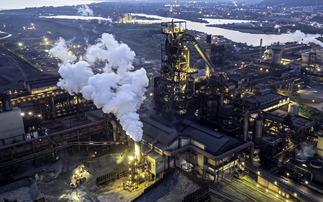The outlook for the global green economy has never looked better, argues James Murray, and the new normal created by the Paris Agreement deserves a lot of the credit
100 days on from the end of the Paris Summit and there are many memories from that dramatic, draining, and defining few days that remain vivid. I suspect some of them will stay with me my entire life.
I remember the way the time delay on the TV screens scattered through the cavernous halls meant that as the deal was done the applause and cheers rippled across the vast site like rolling thunder. I remember Francois Hollande's description of the Agreement as "the most beautiful and most peaceful revolution" and Barack Obama's characteristically eloquent assertion that "we may not live to see the full realization of our achievement - but that's okay". He's right, it is.
I remember, late one night, a woman sitting beside one of the country stands quietly craddling her tiny baby, perhaps a month or so younger than my boy back home in London, and arguably the person at the summit with the most invested in the outcome of negotiations that will shape the rest of the century.
I remember the experienced journalist who without a flicker of sarcasm observed that it is 'nice to report on something that goes well for a change'.
I remember the awful evidence of how badly things can go, as we left our apartment near Gare du Nord on the Saturday morning and came face to face with three soldiers touting sub machine guns as they guarded the neighbouring synagogue.
For all the hope and drama of those few days in Paris, for all the memories, it will be many years until we can gauge the true success or failure of the Paris Agreement. But 100 days on from the gavel coming down we can start to get a sense of how the global commitment to delivering a net zero emission economy is impacting everything from international politics to investment trends.
Ever since that night in Paris, evidence to suggest its ambitious goals might just be delivered has been stacking up.
Just days after the agreement, the Obama administration pulled off another coup extending renewable energy tax credits and effectively engineering an acceleration of the country's renewable energy boom. China followed a few months later with a Five Year Plan that majored on environmental progress and further fuelled speculation the superpower's coal use has already peaked. Canada continued its rehabilitation from climate villain to climate champion, inking a comprehensive bilateral agreement with the US to crackdown on methane emissions and put another stake through the heart of Arctic drilling plans. Sweden edged forward with plans for a carbon neutral economy, as Japan revealed plans to accelerate its emission reductions through to 2030. And the UK government, sadly still a byword for climate policy contrariness, revealed it would take the over-arching goal of the Paris Agreement and enshrine it in national law through a new target to build a net zero emission economy.
This global policy push, coupled with inexorable technological progress (witness the latest record-breaking solar cells and the blistering pace of improvements in energy storage technology), is working. Just weeks after the Paris Agreement the clean energy investment and greenhouse gas emission data for 2015 started to come in, and the stats were better than anyone could have expected. Clean energy investment reached a record $329bn, as it became increasingly clear renewables are now the generation option of choice in multiple markets around the world. In industrialised countries such as the UK emissions kept falling fast, while the IEA suggested emissions globally are remaining flat, despite increasing wealth.
These mega trends are inevitably being felt at the coal face, so to speak, of modern business. Since Paris, US coal giant Arch Coal filed for bankruptcy and Peabody Energy warned it may have to do the same. In the UK, mainstream energy trade body Energy UK delivered its own Road to Damascus moment, announcing its members were primed and ready to deliver a low carbon transition. Iberdrola, one of the few European utilities closely associated with a full bore commitment to decarbonisation, became one of the few European utilities to report decent financial results. The march of the divestment movement continued, as savvy investors all over the world have internalised the logic of the Paris Agreement's goals and recognised that carbon intensive business models' days are numbered. The flight from high risk coal assets gathered pace, just as the development of high risk oil assets slowed.
In the wake of the failed Copenhagen Summit in 2009, Yvo de Boer, former head of the UN climate secretariat would tell journalists the underlying reason the talks faltered was that the key players did not quite yet believe you could decarbonise and continue to deliver economic growth and poverty alleviation. The Paris Summit succeeded because all the key players are now fully signed up to the concept of low carbon growth, in fact in many cases they are already starting to deliver it.
With the dust having settled from the Paris Summit's dramatic denouement it looks increasingly likely the Treaty will be ratified and that the national climate action plans that underpin the agreement will shape the direction of the world's largest economies for decades to come. The few remaining detractors are sidelined and are wisely keeping their counsel. There is even growing optimism amongst well placed sources that a breakthrough on tackling emissions from aviation and shipping could be made this year. The consensus in favour of climate action looks healthier than at any point in recent years, driven by growing evidence clean technologies can deliver healthier and more resilient economies.
Inevitably, this optimistic assessment remains shot through with risk. A second global recession within a decade would undermine low carbon progress when the world can least afford it. A President Trump, with his patented brand of climate scepticism and virulent racism, would test the strength of the Paris Agreement to breaking point, and perhaps beyond. Meanwhile, the latest genuinely terrifying temperature data suggests even if the Paris Agreement's goals are honoured it may already be too late to avoid catastrophic levels of climate change later this century - as a civilisation we have left it eye-wateringly tight to get our act together. We have moved with glacial slowness to reach the point where the Paris Agreement was possible, although the metaphor does not really apply anymore given the fast-melting nature of modern glaciers.
Related to these risks is the on-going failure of much of the media industry worldwide to accurately reflect the scale of the climate risks we face and the breadth and pace of the low carbon revolution Paris aims to unleash. It is a collective failure of journalistic rigour and editorial judgement at least on a par with the mainstream media's inability to spot the 2008 financial crisis. It is also hugely important, because the information gap that results from soft-pedalling on the biggest story of our age means the goals of the Paris Agreement are not yet as firmly entrenched in the political, corporate, and public imagination as they should be.
And yet, 100 days on from Paris it does feel as if something fundamental has changed. Because on the evening of December 12th 2015 a new international norm was created. Once the legalese and diplomatic jargon was translated the new normal, which every business and politician needs to accept, declared unequivocally that business-as-usual cannot and will not go on. It confirmed that the creation of a net zero emission economy within the lifetime of a child today is the primary goal of the international community. It ruled that the age of polluting fossil fuels is drawing to a close. That is what happened 100 days ago - it is a memory worth cherishing.
This article is part of BusinessGreen's Road to Paris hub, hosted in association with PwC.










